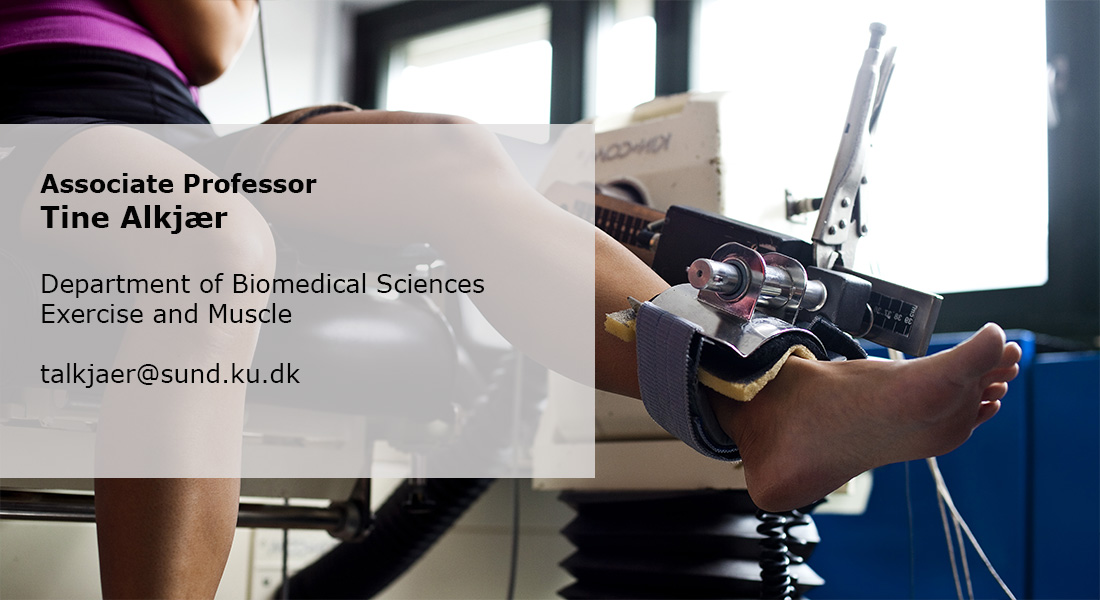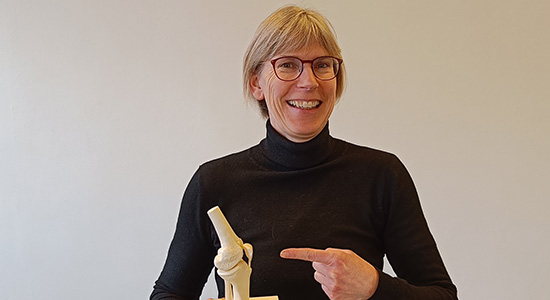Alkjær Group – Human Movement Science
Our goal is to help people to maintain lifelong mobility and function; specifically to prevent onset and progression of musculoskeletal diseases/injuries - particularly of the knee. We use biomechanics to understand and improve function/rehabilitation related to knee diseases and injuries such as osteoarthritis and anterior cruciate ligament rupture.

We study human movement to help people maintain lifelong mobility and function.
We focus on the knee joint because it is the largest joint in the body; essential for walking, activities of daily living, and for sport participation. Thus, a healthy and pain free knee is imperative for an active life.
Knee osteoarthritis (OA) is the most common joint disease and a significant contributor to global disability. The known knee OA risk factors include obesity, surgery, occupational load and injury. Anterior cruciate ligament (ACL) rupture is a frequent knee injury, particularly among young people. An ACL injury or reconstruction often leads to functional impairments and increases the risk of knee OA.
Thus, our research shall contribute to:
- Prevent onset and progression of knee OA.
- Understanding the link between knee injuries and risk of onset/progression of knee osteoarthritis (OA).
- Understanding the biomechanics and function after knee injuries.
- Improve musculoskeletal function/rehabilitation after knee injuries.
- Knee injury prevention.
- Motion capture (12 cam Vicon-Nexus) & force plates (AMTI)
- Biomechanical movement analysis (3D inverse dynamics).
- Musculoskeletal modeling (OpenSim).
- Muscle strength assessments (isokinetics / Biodex dynamometer).
- Muscle activity assessments (electromyography).
- Pressure pain sensitivity assessments.
- Questionnaires (various patient reported outcome measures).
- Group concept mapping; mixed-method for stakeholder involvement (Groupwisdom™).
- REDCap electronic data capture tools hosted at Region H.
Our current research projects are listed below.
A novel tool for personalized and socio-economically optimal treatment planning for patients with osteoarthritis: DEEPMECHANOKNEE under the frame of ERA PerMed (2019).
 Aim: to develop an accurate and fast method to predict the progression of knee osteoarthritis over time.
Aim: to develop an accurate and fast method to predict the progression of knee osteoarthritis over time.- Method: a multi-scale biomechanics and computational modelling, imaging, and clinical data are combined with a deep learning algorithm.
- Expectation: this method can indicate (optimize) the best possible personalized treatment for a patient that could ultimately prevent or delay the progression of knee osteoarthritis.
- Collaboration: University of Eastern Finland, Lund University, University of Oulu, University of Copenhagen and The Parker Institute, Bispebjerg and Frederiksberg Hospital, Copenhagen
Musculoskeletal function in anterior cruciate ligament reconstructed individuals with and without knee pain: MIRAKOS, Innovation Fund Denmark 9088-00006B-under the frame of ERA PerMed (2019).
 Aim: to compare the musculoskeletal function between ACL reconstructed individuals with (“Symptomatic”) and without knee pain (“Asymptomatic”).
Aim: to compare the musculoskeletal function between ACL reconstructed individuals with (“Symptomatic”) and without knee pain (“Asymptomatic”).- Method: musculoskeletal function assessments - see study protocol for details.
- Expectation: detailed description and quantification of muscle function in two groups of ACL reconstructed individuals (Symptomatic, n=30) vs Asymptomatic, n=90). This will provide insight in possible needs for interventions and mechanisms that trigger early onset of knee OA.
- Collaboration: Part of DEEPMECHANOKNEE.
Knee Injury Prediction in Sports (KNIPS), funded by The Ministry of Culture Committee on Research (2021).
 Aim: to develop new concept for knee injury prediction/prevention in team ball sports.
Aim: to develop new concept for knee injury prediction/prevention in team ball sports.- Method: Group concept mapping; mixed-methods; involvement of key stakeholders.
- Expectation: a conceptual model that can be used as a dialogue tool to facilitate knee injury prevention in team ball sports (handball and soccer).
- Collaboration: The Parker Institute, Bispebjerg-Frederiksberg Hospital, Sports Orthopaedic Research Center-Copenhagen (SORC-C), Dept. of Orthopedic Surgery, Copenhagen University Hospital, Amager-Hvidovre, Dept. of Biomedical Sciences, UCPH.
Outcomes in children with anterior cruciate ligament (ACL) reconstruction (2015).
- Aim: to understand how children with ACL reconstruction are evaluated and how they adapt/develop.
- Method: different methodological approaches: literature review (scoping review) and exploratory cross-sectional studies using existing cohort data in pediatric ACL patients and healthy controls.
- Expectation: imrpoved understanding of the outcome after ACL injury and reconstruction in children with the potential to refine rehabilitation of these children to reduce risk of secondary injuries and functional impairments.
- Collaboration: Department of Physical and Occupational Therapy, Bispebjerg and Frederiksberg Hospital, Department of Midwifery, Physiotherapy, Occupational Therapy and Psychomotor Therapy, Faculty of Health, University College Copenhagen, The Parker Institute, Dept. of Biomedical Sciences, UCPH.
The Ministry of Culture Committee on Research [Kulturministeriets Forskningsudvalg] (FPK.2021-0038), “Knee Injury Prediction in Sports (KNIPS)”, (2021).
ERAPERMED2019-331 – DEEPMECHANOKNEE, Innovation Fund Denmark 9088-00006B-under the frame of ERA PerMed (2019).
Group Leader
Tine Alkjær
Associate Professor
Phone +4528757216
talkjaer@sund.ku.dk
ORCID: 0000-0002-9105-3882
Group members
| Name | Title | Phone | |
|---|---|---|---|
| Elisabeth Ann Bandak | Postdoc | ||
| Jonas Schwarz Larsen | Research Fellow | +4535335401 | |
| Kathrine Højte Dahl | PhD Student | +4535324772 | |
| Lauri Stenroth | Guest Researcher | ||
| Mads Skipper Sørensen | Research Fellow | +4535325318 | |
| Mathias Munck Nikolajsen | Bachelor student | ||
| Tine Alkjær | Associate Professor | +4528757216 |

